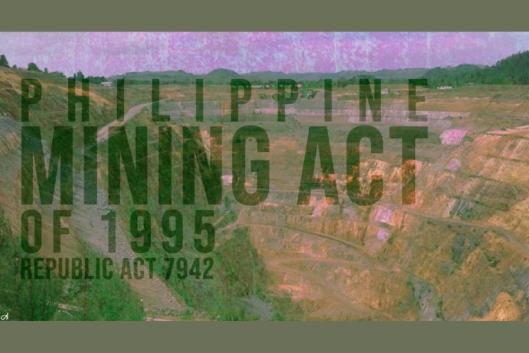The Philippines has a great variety of minerals, including gold, copper, nickel, chromite, manganese, silver and iron. Mineral extraction increased rapidly after it was liberalized by the Philippine Mining Act of 1995, which gives full rights to foreign transnational mining corporations in indigenous territories, including 100% ownership, repatriation of profit and tax holidays thus violating indigenous peoples’ ancestral land rights.
Large-scale mining by foreign firms has become the key to national development for the government of the Philippines, which has put the ancestral domains of indigenouspeoples increasingly under threat of encroachment and has militarized the territories of indigenous communities to force the entrance of large-scaledevelopment projects.
Militarization has especially impacted indigenous women. “When our communities are militarised, we indigenous women not only struggle with the fear and abuse that comes with militarisation of the hinterlands due to mining interests, but we suffer a loss in livelihood as well. A militarised environment makes it difficult for us to access farms due to displacement, checkpoints, curfews, and other types of abuses. Due to influences brought by foreign companies, government soldiers, and others, the role of women in indigenous communities is now changing more rapidly, disintegrating and evolving into the objectified concept of a woman. The rise of sexual harassment, sexual abuse, and sexual violence is greatly increased due to militarisation. These violations happen in a climate of impunity. These abuses are most often denied by the military, as well as national and local governments.”
Militarisation in mining areas has intensified in 2008 with the introduction of the Investment Defence Force, composed of members of the Armed Forces of the Philippines, tasked to protect extraction projects from those who stand in the way of “development”.
In November 2012, an international fact-finding mission of the Observatory for the Protection of Human Rights Defenders highlighted the effects of the ongoing militarization in the region, where the army has taken up the role of law enforcement, multiple illegal private armies have emerged, and paramilitary groups have been legalized, all of which contributes to the spread of human rights violations with impunity.
While large-scale mining operations have negative consequences for those who live in nearby areas, the disproportionate impact on indigenous people make them more vulnerable to many types of human rights violations, including appropriation of land resulting in massive displacement; large-scale destruction of forests and agricultural land; pollution of soil and rivers with toxic chemicals;; disintegration of indigenous society and culture; and the marginalisation of women as food producers in the subsistence economy.
Women Human Rights Defenders (WHRD) are human rights activists who defend women’s rights. In Philippines, the indigenous WHRDs are at the forefront of the struggle against destructive mining in their communities throughout the Philippines, and they have been targeted by State and non-State actors – or by both acting in collaboration. In the case of the community struggle in the province of Itogon, against open-pit mining by Benguet Corporation, indigenous WHRDs played an important role in preventing the expansion of the open-pit mines. Save the Apayao People’s Organisation, a protest group against mining in the mountain range (Cordillera) has strong women leaders resisting the entry of UK’s Anglo-American and Australia’s Oxiana Gold mining companies.
Exchange visits, study tours within a region,the country and to other countries and sharing up-to-date information on mining and actions taken by women and people among organizations working on mining issues have been implemented in an effort to strengthen local communities. This has allowed the groups to give a prompt response to emerging and urgent issues on mining which together with a combination of actions including community barricades and rallies resulted in a moratorium on mining as in the case of mountain provinces in the Cordillera region, and a delay in the implementation ofmining projects.
Article based on: “Mining and Women in Asia: Experiences of women protecting their communities and human rights against corporate mining,” Asia Pacific Forum on Women, Law and Development (APWLD),http://www.apwld.org/pdf/Mining%20with%20cover_opt.pdf ; “Defending Ancestral Lands: Indigenous Women Human Rights Defenders In The Philippines,” AWID,http://www.awid.org/eng/News-Analysis/Friday-Files
/Defending-Ancestral-Lands-Indigenous-Women-Human-Rights-
Defenders-in-the-Philippines#.UR5ZFvRVJkA.facebook
